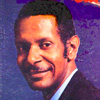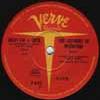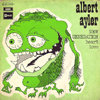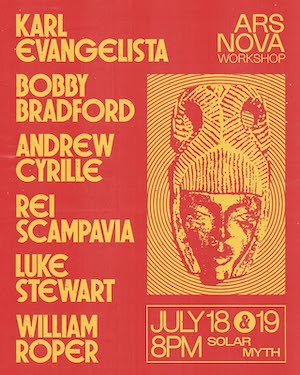-
Posts
2,588 -
Joined
-
Last visited
Recent Profile Visitors
7,893 profile views
ep1str0phy's Achievements
Contributor (5/14)
-
Rare
-
Rare
-
Rare
-
Rare
-
Rare
Recent Badges
-
I'm an epic four years late to this, but my friend Steuart Liebig was in this band. I really like Georgia Blue, but the line on this group is that they were transcendent in a live setting. It's great that this recording is still out there. (That entire YouTube channel is a treasure trove, incidentally.)
-
Damn. Cropper was one of my favorite guitarists in that idiom. His work with Otis Redding and Booker T and the MG's was epochal. I'm struggling to think of a single Stax record that he featured on that I dislike - it's all eminently listenable.
-
That's also a really good one. I like the push-and-pull of Grossman nudging the music into Coltrane territory and the rhythm section vacillating between modalism and abstraction. There's something special about this period in the music. There's just so much crossover in the interval between roughly '65 and the early 1970s, where the boundaries between mainstream and fringe felt porous and mutable. And there were so many sub-factors influencing the development of the music, like the death of Coltrane, the exodus of American jazz musicians to Europe (and vice-versa), the cross-pollination of ideas from Europe, South Africa, Latin America, etc., monumental political upheaval throughout the world, and so on. Our reading of this music is (almost by necessity) informed by historical understanding, as so much of it went undocumented and what we do have in hand has been litigated in writing and discussion for over half a century. I know that some of the board members were there. As far as I know, however, so many of the inherited biases of 21st century jazz friction against the reality of what was happening at that time.
-
The Miroslav Vitous version comes to mind. There's some aggressively angular playing from John McLaughlin partway through. It's definitely in a post-Miles vein, but it threads the needle between fusion and modal/quasi-free jazz quite nicely: And then there's this version by the Ethnic Heritage Ensemble, which is squarely free funk territory. I love the surrealist solos superimposed over the (very insistent) groove:
-
Yeah, Jacknife is the one I go to after the Moncur/Hutcherson groups. It's very early for DeJohnette, but his playing animates what might have otherwise been a routine session. I like the "Is" Sessions double CD, too. The music seems to occupy a midway point between the Lost Quintet and Circle. The energy is off the charts, even if the improvisations can feel a little incoherent at times. IMO the real knock on the recording is that the music lacks a guiding voice - there's no Miles to editorialize the rambling or a Cecil or Braxton to give the freedom explicit direction. It's a transitional moment for virtually everyone involved.
-
This is a really unusual one that I rediscovered recently - a Kalaparusha record w/Karl and Ingrid Berger, Jumma Santos, and Tom Schmidt (the latter of whom I am not familiar with): It's great to hear DeJohnette in this sort of rambling free jazz context. It lacks the precision of something like Special Edition, but it serves as nice connective tissue to the AACM music made in Paris in the '60s and NY in the '70s.
-
DeJohnette was a giant. I saw him live only once - in a transcendent trio with Ravi Coltrane and Matthew Garrison - and I marveled at his ability to make a large hall sound small. He had an uncanny time feel, but more than anything else, I appreciated his talents as a texturalist. Considering the fact that he came out of that Miles/Jackie McLean continuum of shredding post-bop drummers, it's amazing what he could do with space and timbre. That final Special Edition record with the AACM guys is pretty extraordinary in that way. (I also like Wadada's The Great Lakes Suites, with Threadgill and John Lindberg, as a recent example of DeJohnette's work in freer contexts.) I second what Steve says about appreciating our giants while they're still here. Cyrille is my hero and a friend, but I sincerely believe that people still don't understand how remarkable he is. There are a host of elder statespeople, like Hamid, Michael Zerang, Gerald Cleaver, Donald Robinson, Chad Taylor, Suzie Ibarra, Marc Edwards, and so on who are still issuing relevant and powerful work. More of an implicit part of the conversation, but the calculus of the music has just changed a lot. Things that seem "new" or woefully contemporary, like the drumming of a Chris Dave or Thomas Pridgen, have been well and truly digested at this point. In the age of new media, music moves incredibly fast. IMO the biggest issue is that art moves too fast, and kids now are tasked with internalizing innovation without accumulating the lived experience that gives that innovation meaning.
-
Hello, all- I'm proud to present my last release of the year (and, hopefully, my last bit of member spam) - Bukas, releasing next Friday, August 22, on 577 Records. Bukas documents a band assembled for two Bay Area shows in May of 2023. This was my first major project after the birth of my child and the effective end of social distancing, and it serves as a celebration of the resilient free jazz music that helped me weather a difficult time in our lives. Using the words of John Coltrane as a conceptual tether, this album argues that Free Music can help to shape a world informed by conscience and decency. This is an idea of value, I think, at times like these. Bukas features the legendary Andrew Cyrille, playing some of his most incendiary drums of recent years. He's joined by Asian Improv aRts cofounder Francis Wong, Lewis Jordan (of the storied Bay Area band United Front), bassist Lisa Mezzacappa, and keyboardist Rei Scampavia (of Grex). The album may be pre-ordered/ordered here: https://577records.bandcamp.com/album/bukas And here's a quick video about the project: All the best to you all, K
- 1 reply
-
- free jazz
- free improvisation
-
(and 1 more)
Tagged with:
-
Hello, all- I'm not sure how many of you live near Philadelphia, PA, but these shows are going to be an event. On July 18-19, I'll be in residency at Solar Myth in Philadelphia (courtesy of Ars Nova Workshop). I'll be joined by the insane company of masters Bobby Bradford and Andrew Cyrille, as well as LA tubaist William Roper, bassist Luke Stewart, and Grex mate Rei Scampavia. This project had its genesis in the California wildfires earlier this year. As you may be aware, Bobby and Roper lost their Altadena homes. In the process of our relief effort, the idea arose to reunite Bobby and Andrew - two veterans of John Carter's Roots & Folklore saga. These dates mark the only occasion that the two of them will have played together in several decades, as well as Bobby's first appearance on the East Coast in some time. (Bobby actually turns 91 that weekend!) Appropriately, I'll be presenting a brand suite piece of music - "Taglish II," which explores the Filipino-American experience in 2025. It revisits some of the themes and character of John Carter's music, although the sonics of the piece are squarely contemporary. Tickets are available HERE More Info: https://www.arsnovaworkshop.org/programs/karl-evangelista-bobby-bradford-andrew-cyrille-rei-scampvia-luke-stewart/
-
Thanks for sharing, Alex! I know it must be tough to put this into words. Contextualizing this in terms of a formal breakdown of a performance is a brilliant touch.
-

Hooker/Braufman/Lewis June 26 @ Tubby's Kingston
ep1str0phy replied to clifford_thornton's topic in Live Shows & Festivals
This looks like a blast, man. I didn't even know about the reissue - excited to check that out. -
Thanks for the kind sentiments, all. These circumstances are sad, but I hope that they provide an opportunity for people to revisit (or discover) Louis's music. I mean this with all sincerity - IMO, Louis was always at his best in Alex's company. Keep Your Heart Straight as an all-timer, and it stands out even among the many brilliant piano-drum duets that Louis essayed. Uplift the People is similarly masterful, and the seemingly indefatigable power of Louis's drumming on that record must surely rank among the best of his later career. Clifford, I'm assuming you're familiar with the Old Stuff record on Cuneiform? It's the same band that appears on the America record. There's a version of "Rosmosis" on Old Stuff that is just unbelievable - a testament to how Louis could make a meal out of these repetitive, trancelike grooves. Having been lucky enough to know both Louis and Milford, I'm not an objective observer of this music - but their wildly different approaches service the music in profound ways.
-
I owe an awful lot to Louis. He’s one of a special handful of my childhood heroes whom I met and liked even more. He was doggedly invested in the idea of art as a form of resistance, and he played accordingly. There was an intention and directness behind his drumming that was uncanny, and it forced the burdens of the real world to retreat into chasms of sound. He seemed to master things like pain and injustice with the power of his sound. And he made it seem like so much fun that from the moment I met him, I wanted to be just like him. Music saved me from a desk job, and Louis saved me from only wanting to be around music. His lived experience as a rebel against Apartheid, manifesting his art as this noble struggle against bullies and tyrants, resonated with me completely. At times such as now, it’s so easy to feel directionless and impotent. Louis’s music taught me that you can never lose the battle so long as you continue to fight, and constantly. Louis also helped me to resolve some internal contradictions with my own identity. As a Filipino American, I have often struggled with the fact that I am spiritually Filipino and yet American in temperament and mind. Louis had a visceral commitment to abstraction that was paradoxically couched in his love for South African tradition. Everything was The Song. As soon as I understood this, it became easier for me to be myself and yet wholeheartedly the son of my ancestors. I only met Louis on a handful of occasions. The brilliant and indispensable Alexander Hawkins reconnected us. In 2018, I journeyed to London to record an album called “Apura!” (released in 2020 on Astral Spirits). This record may have been Louis’s last chronological recording, although a wonderful record with Bay Area powerhouse Patrick Wolff - recorded only a few days before “Apura!” - came out in 2024. You have to understand, Louis was/is my hero. My favorite musician. So when the opportunity for this session came up, I practiced for 3, 4, 5, etc. hours a day for over a month. I practiced solo. I practiced along with recordings. I set up sessions with friends and gigged constantly. I think I could play like 60% of all Blue Notes songs cold. I practiced so much that I credit this session with helping to me to develop a clear sonic identity, which I don’t think I truly obtained at until the lockdown era. When I arrived at the session, the first thing I heard was Louis’s cymbals. They have a shimmering, eerily distinctive sound. When I sat down at my booth, I realized that Louis wasn’t using sizzle cymbals. He had taken a few pence and just laid them, unsecured, on his rig. They were like this for the full two days that we recorded, and I watched them fall countless times. As we played, it slowly dawned on me that the practice I had done had not actually prepared me for the session. True and natural free improvisation requires a degree of flexibility and intuition that you can’t arrive at with woodshedding alone. Louis was all improvisation. He even improvised his cymbals. Every day, I strive somehow to be the way that Louis was. To play naturally, like a heartbeat. Louis helped to restore me to the person I actually am, whose ancestors farmed and fished, fighting colonialists and fascists in the sugar cane fields. I may not have known Louis very well, but I do know that he’d be proud of anyone continuing the struggle that he once led - especially other musicians. Louis, Dudu, Mongezi, Mbizo, Chris, Nik, and their kin are reunited now, and they will continue to teach us so long as there are people willing to learn.
_forumlogo.png.a607ef20a6e0c299ab2aa6443aa1f32e.png)






